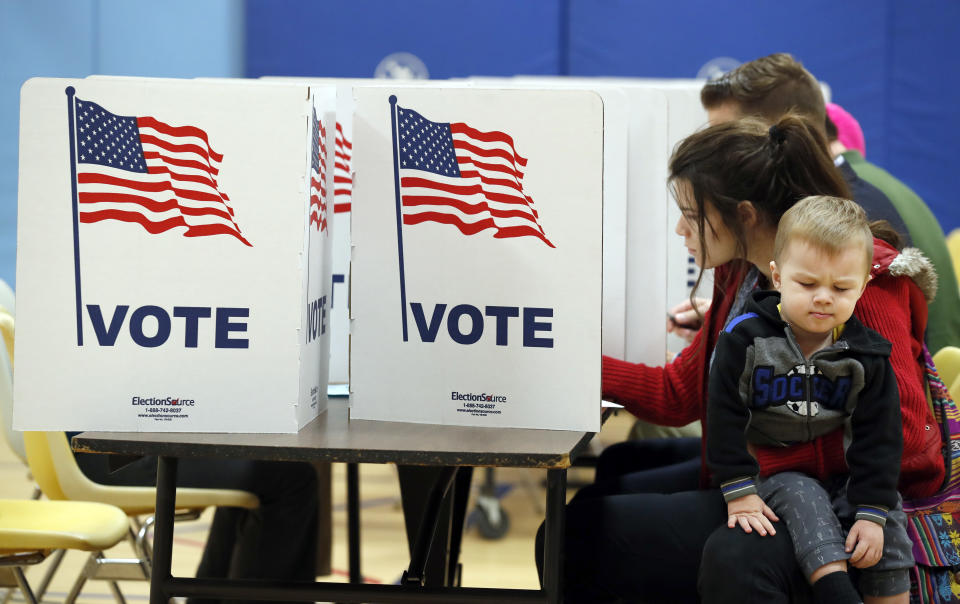Democrats are upping their game in local races this year

WASHINGTON — A Maine ballot initiative to expand Medicaid. More than a dozen contested seats in the Virginia House of Delegates. A lone Washington state Senate seat. Mayoral elections in Charlotte and Fayetteville, N.C. — and also in Albuquerque, N.M., Syracuse, N.Y., and St. Petersburg, Fla.
These are just some of the contests national Democrats will be watching Tuesday night after what an array of groups describes as the most intense and coordinated national effort to elect Democrats to down-ballot state and local offices in modern party history.
The Democratic National Committee, whose chair, Tom Perez, has sought to revive Howard Dean-style investments in state parties in nonpresidential election years, has been sending money to state parties to help get out the vote in mayoral elections.
“This is the first time the DNC has made investments in mayoral and down-ballot races. Our investments are unprecedented for the DNC,” said Sabrina Singh, a spokesperson for the national Democratic group. The DNC last week announced investments in the state parties in New Hampshire, Florida, New York, North Carolina and New Mexico, with the goal of boosting voting numbers in mayoral contests.

In Virginia, said Singh, 33 different outside groups are doing work, in addition to the Democratic committees and individual campaigns.
Among them is a group called Sister District, which was founded by a group of women who met on Facebook the day after the 2016 election. It’s funneled the energy and fundraising power of 25,000 volunteers across the country into 13 House of Delegates contests in Virginia and the Washington state contest, raising more than $350,000 for them and banking more than 100,000 calls. A Democratic win in Washington would flip control of the chamber, giving Democrats control of all three branches of Washington state government and painting the Pacific states from Canada to Mexico a line of unbroken blue.
Also on the ground in Virginia are a new, Trump-era group called Flippable, which focuses on flipping seats in state legislatures; the resistance movement group Indivisible, and Bernie Sanders’ Our Revolution. They are working side by side with more established groups, such as Planned Parenthood, NARAL, SEIU and a host of other labor unions, and the Democratic Legislative Campaign Committee (DLCC).
The DLCC has raised a record $10 million since President Trump was elected — a more than 450 percent increase from 2016. It says it has knocked on more than a million doors to turn out voters for the Virginia House of Delegates contests, more than doubling last year’s efforts in the state.

The most closely watched contest Tuesday is the governor’s race in Virginia, where final polls continued to show a narrow lead for Democrat Ralph Northam over Republican Ed Gillespie in the race to replace departing Gov. Terry McAuliffe. Virginia political experts point out that while the state has trended blue in statewide elections, it is still very much a purple state, where Democratic wins are often narrow and hard-fought. Incumbent Democratic Sen. Mark Warner beat Gillespie in 2014 with a 0.8 percent margin. McAuliffe won election in 2013 with a 2.6 percent margin over Republican Kenneth Cuccinelli. By all accounts from those doing on-the-ground-organizing, the result of today’s gubernatorial election is also likely to be tight.
But below the radar, say grassroots organizers, Northam’s effort is being aided by the intensive get-out-the-vote organizing for the freshly competitive House of Delegates races. This year, 88 of the 100 districts will see head-to-head contests featuring Democrats, compared to 29 districts in 2015. Democrats currently hold only 34 seats.
“In some ways, the House of Delegates [fight] may carry the top of the ticket,” said Lyzz Schwegler, co-founder and director of communications of the Sister District Project. “There are some split-ticket voters in Virginia, but by and large, if someone is motivated enough to vote all the way down ballot, they’re going to be motivated enough to vote for the top of the ticket.”
Carolyn Fiddler, the political editor at Daily Kos and former communications director for the DLCC, is predicting a five-to-eight seat pickup for Democrats in the Virginia house, where Republicans currently hold a substantial majority and would need to lose 17 seats for the chamber to flip from red to blue. Thanks to redistricting, that will be hard to overcome, no matter how strong the blue wave is this year. Mara Sloan, a spokesperson for the DLCC, is predicting an up to eight seat gain. Catherine Vaughan, founder of Flippable, is predicting a gain of at least five seats.
“Even in big wave years, you don’t see 17 seats flipping,” said Vaughan, noting that 97 percent of incumbents win re-election in Virginia and only two of the target seats are open contests.
But the small number of predicted pick-ups belies the extent of the organizing and fundraising going on. The combination of an expanded field and focused national attention has led to a boom in small-donor enthusiasm for the Virginia House of Delegates candidates, with three times as many donations of $100 or less going to them than in 2015 and eight times as many as in 2009. “And it’s 13 times as many grassroots donors as Republican candidates mobilized this year,” said Vaughn.
Notably, many of the leading figures on the left doing work in the down-ballot space are female. So are the candidates. In Virginia, a record 43 women are running for House of Delegates seats. In Washington state’s 45th Senate district, where there is a special election today, both candidates seeking the open seat — the Republican, Jinyoung Lee Englund, and the Democrat, Manka Dhingra — are female. The race there is neck and neck.

The new Democratic effort to contest every race possible, even in the face of daunting odds, has extended all the way to Georgia, where nine state legislatives seats are on the ballot in special elections Tuesday — and all are being contested. Last year, 83 percent of state legislative seats in Georgia were uncontested.
During the Obama years, the Democratic Party’s hold on state and local offices underwent a sharp deterioration as the national party stopped investing in local party-building, and gerrymandering gave Republicans an advantage in state legislatures, as well as in Congress, in major states like Virginia and Pennsylvania. Democrats have lost more than 900 state legislative seats across the country since 2009, and now hold only 43 percent of its 7,383 state legislative seats. Democrats held a majority of those seats when President Barack Obama took office.
In Virginia, two of the most high-profile races are in the 13th district in northern Virginia, where the incumbent of more than two decades, staunch social conservative Republican Del. Robert Marshall, is being challenged by Democrat Danica Roem, the first transgender candidate to run for office in the state. In southwest Virginia’s 12th district, near Blacksburg, Democratic challenger Chris Hurst, whose reporter girlfriend was shot and killed on live television in 2015, is taking on incumbent Republican Joseph Yost.
The 2nd, 41st and 32nd districts will also be ones to watch. The DLCC is keeping tabs on 16 seats in Virginia — 13 of which are currently held by Republicans — and 10 seats in the New Jersey state Senate and assembly, where it is hoping to expand the existing Democratic majorities and add up to six seats.
When the dust clears, the extraordinary coordinated campaign in Virginia could provide a model for other states in 2018, showing the power of an approach that runs the length and breadth of the ticket. And in many ways, the state is perfect territory for a test run between old and new groups, because of Virginia’s loose campaign finance laws, which allow a level of coordination between campaigns and committees and outside groups not possible in many other states.
While the groups may not be able to work as closely together in future, what they learned this year will stay with them.
So, too, they hope, will the candidates who were recruited, most of whom are likely to lose their contests on Tuesday night. Retaking the Virginia House of Delegates will be a battle that could take several more election cycles, Fiddler predicted, but if this year’s first-time candidates run again in 2019 and 2021, when they are better known, and sharper, the Virginia Democrats may finally have a chance.

Read more from Yahoo News:



